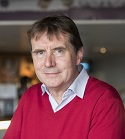Bad bugs, no drugs: A world without antibiotics

Imagine a world where you are quite likely to die after having a tooth out. Or maybe fear for your life when you get a common infection like tonsillitis or a bout of food poisoning. Sounds like dark ages, right? Well, according to leading researchers, this could be life in the near future because many of the antibiotic drugs we have now are going to stop working.
"They will stop working, so we have to find an alternative. We do not have a choice.”
These are the powerful words of Professor Chris Dowson, a research microbiologist from the University of Warwick working on infectious diseases. He is helping to spearhead a new charity fighting this healthcare time bomb.
Crisis
“The last class of good antibiotics were discovered in the 1980s,” explains Professor Dowson. “We now have only have a few in our armoury and they are becoming less and less effective. We need to treat this as the crisis it is. We need to treat this as seriously as we do cancer – with many more researchers, much more funding and working quickly.”
The world finds itself in a situation where common infections like E. coli are becoming resistant to the antibiotics we currently have to treat them. This is down to a number of factors, not just overprescribing by healthcare professionals. Antibiotics have been used for a whole host of applications over the years which means the drugs are endemic in our environment allowing the microbes that cause infections to build resistance.
Awash with antibiotics
Professor Dowson explains: “The world is awash with antibiotics. Having prescribed them unnecessarily for a sore throat is just the tip of the iceberg. Careless and pervasive use of antibiotics in world farming systems mean they leach into our soils and water systems. There are some other, surprising common practices too – for example, using antibiotic treatments to clean the bottoms of boats, or spraying fruit in orchards.
"We are using the most powerful and effective medicines we have like Domestos. Constant low-level exposure means bugs build resistance to the drugs, so when we really need them they are less effective. There are already cases of multi-drug resistant E. coli and TB in some areas of the world. At the moment we are losing the battle.”
More money – more solutions
Professor Dowson is campaigning for more resources to be devoted to research into antimicrobial resistance – fighting the advance of superbugs and finding new chemicals to use as treatments. He is one of the founders of Antibiotic Research UK (ANTRUK)Link opens in a new window, a charity organisation set up to raise awareness and funds to tackle the rise of antimicrobial resistance.
 He explains: “Antibiotics have been the most successful medical advancement in modern history. It’s not just that we could treat infections like pneumonia, but we could also use them to fight infection during and after surgery. They now underpin most operations like hip and knee replacements or heart by-pass, caesarean sections, cancer therapy, a lot of diabetes treatments and so much more. Without them we will be taking a huge step backwards.
He explains: “Antibiotics have been the most successful medical advancement in modern history. It’s not just that we could treat infections like pneumonia, but we could also use them to fight infection during and after surgery. They now underpin most operations like hip and knee replacements or heart by-pass, caesarean sections, cancer therapy, a lot of diabetes treatments and so much more. Without them we will be taking a huge step backwards.
“But there are so few scientists working on finding a solutions. We need at least a 100-fold increase in everything we are throwing at the problem. One hundred times as many researchers and money. We also need to engage the global pharmaceutical companies who are not interested in developing new formulations. We, as civil society, need to see the value in these things before it is too late.”
Loss of the wonder drugs
Professor Dowson says we are now at crisis level in terms of the drugs we have left which are effective. The scientific community recognised the potential cliff edge in the 1990s – it was the font cover of Science and Nature in 1994. But the world has been slow to catch on and now time is running out.
“Antibiotics have been the greatest medical discovery of the 20th Century, but we face the potential loss of these wonder drugs,” warns Professor Dowson. “We need to act now to find new alternatives – for your own old age and for your children’s future health."
 Professor Chris DowsonLink opens in a new windowLink opens in a new window heads up the Infectious Disease Research GroupLink opens in a new windowLink opens in a new window at Warwick, a multi-disciplinary group working to understand the the evolution of antibiotic resistance and virulence across a wide range of bacteria.
Professor Chris DowsonLink opens in a new windowLink opens in a new window heads up the Infectious Disease Research GroupLink opens in a new windowLink opens in a new window at Warwick, a multi-disciplinary group working to understand the the evolution of antibiotic resistance and virulence across a wide range of bacteria.
He is an elected member of the board of trustess and also sits on the science committee of Antibiotic Research UK (ANTRUK)Link opens in a new windowLink opens in a new window.
Terms for republishing
The text in this article is licensed under a Creative Commons Attribution 4.0 International License (CC BY 4.0).
Share

